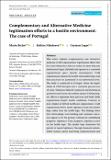Files in this item
Complementary and alternative medicine (CAM) legitimation efforts in a hostile environment : the case of Portugal
Item metadata
| dc.contributor.author | Bicho, Marta | |
| dc.contributor.author | Nikolaeva, Ralitza | |
| dc.contributor.author | Lages, Carmen | |
| dc.date.accessioned | 2023-02-23T15:30:01Z | |
| dc.date.available | 2023-02-23T15:30:01Z | |
| dc.date.issued | 2023-05-01 | |
| dc.identifier | 283258063 | |
| dc.identifier | cb414289-b0b7-4f2c-81fb-7c4072dedcdf | |
| dc.identifier | 85148662145 | |
| dc.identifier.citation | Bicho , M , Nikolaeva , R & Lages , C 2023 , ' Complementary and alternative medicine (CAM) legitimation efforts in a hostile environment : the case of Portugal ' , Sociology of Health and Illness , vol. 45 , no. 4 , pp. 890-913 . https://doi.org/10.1111/1467-9566.13625 | en |
| dc.identifier.issn | 0141-9889 | |
| dc.identifier.other | ORCID: /0000-0002-8422-0654/work/129709211 | |
| dc.identifier.uri | https://hdl.handle.net/10023/27042 | |
| dc.description | Funding: This work was funded by National Funds through FCT – Fundação para a Ciência e Tecnologia under the projects: UID/ECO/00124/2013, UID/ECO/00124/2019, UIDB/00315/2020; by Social Sciences DataLab under the project: LISBOA-01-0145-FEDER-022209; by POR Lisboa under the projects LISBOA-01-0145-FEDER-007722 and LISBOA-01-0145-FEDER-022209; and by POR Norte under the project: LISBOA-01-0145-FEDER-022209. | en |
| dc.description.abstract | This article explores complementary and alternative medicine (CAM) organisations’ legitimation efforts that face extra obstacles as they are subject to more than one institutional logics (hybrids) and operate in a contested organisational space (hostile environment). CAM organisations espouse the health and market logics and their practices are questioned at an institutional level. The study is conducted in Portugal, where the legalisation of CAM therapies was a contested process over 10 years. Taking an abductive approach and drawing on qualitative interviews, the authors analyse CAM managers’ efforts to legitimise their practices and build viable organisations despite hostile conditions. Contrary to prior studies of hybrid healthcare organisations, CAM organisations derive moral legitimacy from the market logic rather than the health logic. The findings show that relationships, trust-building and consumer education appear to be the primary vehicles for establishing pragmatic legitimacy. Thus, pragmatic legitimacy relies on the health logic. The market logic dominates the pursuit of moral legitimacy through financial sustainability, human capital, marketing communications and partnerships, and advocating complementarity with biomedicine. We propose a model through which organisations use pragmatic legitimacy to enhance moral legitimacy and to create recursive feedback between moral and pragmatic legitimacy on the path to cognitive legitimacy. | |
| dc.format.extent | 24 | |
| dc.format.extent | 407385 | |
| dc.language.iso | eng | |
| dc.relation.ispartof | Sociology of Health and Illness | en |
| dc.subject | Hybrid organisations | en |
| dc.subject | Complementary and alternative medicine | en |
| dc.subject | Hostile environment | en |
| dc.subject | Legitimacy | en |
| dc.subject | HD28 Management. Industrial Management | en |
| dc.subject | R Medicine (General) | en |
| dc.subject | DAS | en |
| dc.subject | SDG 3 - Good Health and Well-being | en |
| dc.subject | MCC | en |
| dc.subject.lcc | HD28 | en |
| dc.subject.lcc | R1 | en |
| dc.title | Complementary and alternative medicine (CAM) legitimation efforts in a hostile environment : the case of Portugal | en |
| dc.type | Journal article | en |
| dc.contributor.institution | University of St Andrews. School of Management | en |
| dc.contributor.institution | University of St Andrews. Centre for Energy Ethics | en |
| dc.identifier.doi | 10.1111/1467-9566.13625 | |
| dc.description.status | Peer reviewed | en |
This item appears in the following Collection(s)
Items in the St Andrews Research Repository are protected by copyright, with all rights reserved, unless otherwise indicated.

